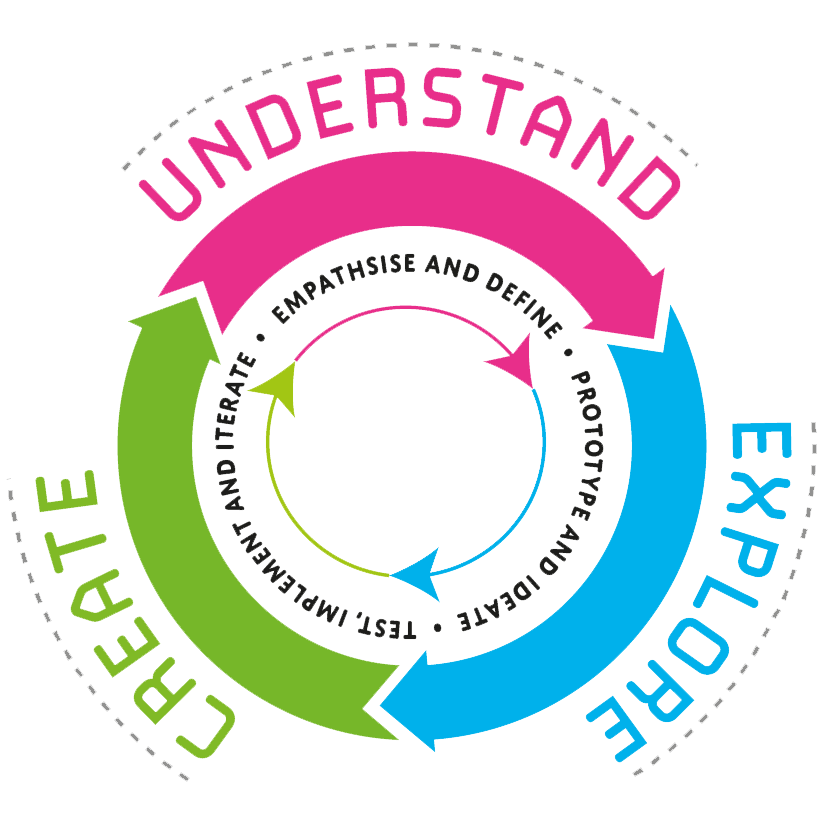Introduction
Coming to London in February 2019
Design Thinking and Product Development Workshop Agenda
9 a.m. to 11 a.m.
Presentations:
- Overview of media industry trends in data- and AI-driven product development and design thinking
- Managing change: Embracing the essential human side of product development
- Case study 1: How a major media company leveraged design thinking to develop game-changing revenue
- Case study 2: Building hundreds of products with a dozen product teams. How we built a new structure for growth with cross-functional teams and design thinking principles
11 a.m. to 1 p.m. Introduction to design thinking principles, Corey Ford, Managing Director, Matter, San Francisco
1 p.m. lunch
2 p.m. to 4 p.m. Design thinking exercises. Developing the first phase of a winning product, Corey Ford, Managing Director, Matter, San Francisco
Matter has developed a design thinking methodology that applies this cross-disciplinary, human-centered, prototype-driven mindset to the design of a business. Every venture is a set of testable assumptions: Matter’s design thinking process ensures that new ventures are desirable to their target markets, feasible to develop and financially viable.
This hands-on workshop provides an introduction to the Design Thinking process and mindset. The workshop is based on the long-running accelerator program Matter runs for its 73 portfolio companies, 44 newsrooms and 12 media partners, including the Associated Press, The New York Times, and McClatchy.


Matter is the world’s leading start-up accelerator and venture capital firm focused on supporting media entrepreneurs and intrapreneurs. Ford has helped build media start-ups for media brands such as The New York Times, the Associated Press, and McClatchy in the United States.
The workshop focuses on principles of design thinking-based product development through this hands-on workshop. The workshop is the first lesson for participants in Matter’s 20-week product design program. The event will:
- Provide an introduction to the mindset changes and process of design thinking product development through a hands-on, half-day of project design
- Explore each phase of the process including empathy, problem definition, ideation, prototyping, and iteration.
Who should attend:
This workshop is relevant to any media professional looking to develop products, and improve their product development skills. Participants from the C-Suite to entry level and across the professional spectrum from engineering to journalism will find this workshop relevant. Design thinking encourages a multidisciplinary, cross-company approach. Solo participants and cross-disciplinary teams are welcome to attend.
Hands-On Seminar about product, presented by Matter in San Francisco and NYC, and sponsored by Google. More about Matter and its product development mission in Silicon Valley can be found at http://matter.vc
What participants are saying:
I’ve learned such a huge amount in terms of how to build a team, iterate, and fail forward.
Ceci Mourkogiannis, CEO, Pie
I feel like I’m armed with the tools to take on the future of our business.
Nick Smit, Co-Founder, Huzza
The greatest gift Matter has given us is a rigorous adherence to design thinking. It taught us to embrace failures as learning opportunities.
Nadya Lev, CEO, Aconite
Matter is a big part of KQED’s “outside in” innovation strategy. We leverage Matter’s design thinking and connections to entrepreneurs.
Tim Olson, VP Digital & Education
KQED
Matter is a source of innovation for our company and a training camp for our people, all rolled into one.
Jim Kennedy, SVP Strategic Planning
The Associated Press
Meet the Design Thinking trainer
 Corey Ford is Co-Founder and Managing Director of San Francisco-based Matter Ventures. Corey Ford earned an MBA at the Stanford University Graduate School of Business, and is the co-founder and managing director of Matter, a San Francisco- and New York City-based start-up accelerator that supports and invests in media entrepreneurialism.
Corey Ford is Co-Founder and Managing Director of San Francisco-based Matter Ventures. Corey Ford earned an MBA at the Stanford University Graduate School of Business, and is the co-founder and managing director of Matter, a San Francisco- and New York City-based start-up accelerator that supports and invests in media entrepreneurialism.
Ford is a former lecturer at Stanford Institute of Design, Stanford University’s “d School”, where he taught multi-disciplinary teams of graduate students and executives how to innovate using the IDEO-based, human-centered, prototype-driven design thinking process, including customer research, synthesis, idea generation, rapid prototyping and user testing.
